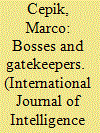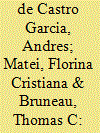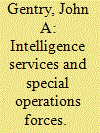|
|
|
Sort Order |
|
|
|
Items / Page
|
|
|
|
|
|
|
| Srl | Item |
| 1 |
ID:
155382


|
|
|
|
|
| Summary/Abstract |
Comparing intelligence services meets three recurrent challenges. Getting to know what is unique about specific organizations in different countries is always a powerful research driver. The general preference, then, is for insightful descriptive case studies. Second, the intricacy of the international security context and its dual level dynamics tend to drive off comparative studies. Third, the legal and practical impediments for researching organizations with secrecy and deception as constitutive features make evidence-based comparative assessments difficult. Indeed, intelligence might well be an odd subject for comparatists. Nonetheless, intelligence systems in different countries do undertake a similar set of missions and functions. They vary in terms of effectiveness and legitimacy according to the institutional history, political culture, and relative power and wealth of each country.
|
|
|
|
|
|
|
|
|
|
|
|
|
|
|
|
| 2 |
ID:
155383


|
|
|
|
|
| Summary/Abstract |
European nations might consider an institutional option in their ongoing fight against terrorism. Research on intelligence reform globally indicates that certain institutional innovations to combating terrorism that may not have been seriously considered by decisionmakers in some European countries.
|
|
|
|
|
|
|
|
|
|
|
|
|
|
|
|
| 3 |
ID:
155384


|
|
|
|
|
| Summary/Abstract |
Cyber intelligence analysis is without doubt one of the fastest growing components of the intelligence enterprise.
|
|
|
|
|
|
|
|
|
|
|
|
|
|
|
|
| 4 |
ID:
155381


|
|
|
|
|
| Summary/Abstract |
A key task for intelligence oversight in democracies is to ensure that the intelligence services operate and carry out their mandated duties within the constraints of national and international law. As the control of the activities and methods of intelligence services necessarily involves a group of overseers who gain access to classified information about state secrets, democratic oversight inherently entails a security dimension. To date, the degree to which democratic oversight might affect state security has not been investigated in depth by Security or Intelligence Studies, although the issue has occasionally come up. After the 11 September 2001 terrorist attacks on the U.S., somewhat risk-averse services, due to extensive oversight, were mentioned as possible explanation for the intelligence failures leading to the catastrophic events.
|
|
|
|
|
|
|
|
|
|
|
|
|
|
|
|
| 5 |
ID:
155380


|
|
|
|
|
| Summary/Abstract |
Special operations forces (SOF) typically are small, relatively light-armed forces that rely on both their skills, and the stealth and surprise generated largely through intelligence support, to conduct strategically important missions that are often covert or clandestine. The SOF often rely heavily on national civilian as well as military intelligence agencies. Their use in sensitive operations typically requires senior-level political confidence in SOF and a domestic political climate that accepts special operations as legitimate instruments of national policy.1 Colin S. Gray, “Handfuls of Heroes on Desperate Ventures: When do Special Operations Succeed?” Parameters, Vol. 29, No. 1, Spring 1999, pp. 2–24.
[Google Scholar]
The major intelligence services also conduct “covert action” missions—plausibly deniable activities authorized by national political leaders—for strategically important reasons when other policy options are unavailable or unattractive. These activities occasionally involve the use of force by capable, specialized armed forces that are component parts of the agencies.
|
|
|
|
|
|
|
|
|
|
|
|
|
|
|
|
| 6 |
ID:
155386


|
|
|
|
|
| Summary/Abstract |
Insights and models from the subfield of political development—timing and sequencing, temporality and long-term processes, and intercurrence—can improve the work of strategic intelligence analysts by enhancing discontinuity and opportunity analysis, enriching conceptual schema and imagination, and mitigating a number of problematic cognitive biases. Broadly, a strong grounding in key concepts of political development will help analysts engage in more complex and integrative thinking, a factor which has been found to be a positive determinant of accuracy in forecasting.
|
|
|
|
|
|
|
|
|
|
|
|
|
|
|
|
| 7 |
ID:
155385


|
|
|
|
|
| Summary/Abstract |
Early warning—together with deterrence and military decisionmaking, comprising Israel’s national security “triangle”—became a central element of Israeli strategy in the second half of the 1950s. Since then, providing early warning of an impending conflict has become a priority and considered as the ultimate test for the Israeli Intelligence Community (IC) in general, and the Israel Defense Forces (IDF) Intelligence Directorate (AMAN) in particular. Yet, surprisingly, attempts to conceptualize and regulate early warning in Israel are relatively poor, especially when compared to the extensive conceptualization of early warning in other advanced Western countries. Indeed, the Israeli IC has attempted to differentiate between the types of early warning which its components are required to provide (understanding that early warning cannot be discussed as a monolith) that are intended to address a range of essentially different environments. At the same time, Israeli discourse on the subject continues to suffer from a lack of clarity and consistency, in the absence of a substantial theoretical foundation for the issue.
|
|
|
|
|
|
|
|
|
|
|
|
|
|
|
|
|
|
|
|
|